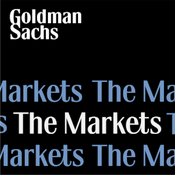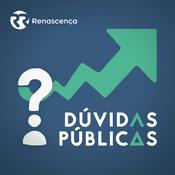502 episódios
The Last Bubble? Finding Value in a World on Fire | Jeremy Grantham & Edward Chancellor
02/2/2026 | 49minIn Episode 461 of Hidden Forces, Demetri Kofinas speaks with co-founder and chief investment strategist of GMO, Jeremy Grantham, and financial historian, journalist, and investment strategist Edward Chancellor. Together, they have collaborated on Jeremy's autobiography, titled "The Making of a Permabear," which chronicles Grantham's evolution as a value investor and the valuable lessons that can be learned from his six-decade career in investment management.
They spend the first hour of their conversation discussing the collaboration behind the book, Grantham's formative experiences in finance, the principles that have guided his investment philosophy, the role of mean reversion in asset markets, and why they both believe that US equities are more overvalued today than at almost any point in history—with important implications for where returns will come from over the next decade.
The second hour is devoted to a conversation about the mechanics of financial bubbles, the relationship between ultra-low interest rates and asset price inflation, Jeremy's framework for navigating overvalued markets by shifting capital to international and emerging market equities, the challenges of selecting investment managers, and Grantham's deep concerns about existential risks to human civilization—including climate change, resource scarcity, and the toxic assault on human fertility that he believes poses an underappreciated threat to our species' long-term survival.
Subscribe to our premium content—including our premium feed, episode transcripts, and Intelligence Reports—by visiting HiddenForces.io/subscribe.
If you'd like to join the conversation and become a member of the Hidden Forces Genius community—with benefits like Q&A calls with guests, exclusive research and analysis, in-person events, and dinners—you can also sign up on our subscriber page at HiddenForces.io/subscribe.
If you enjoyed today's episode of Hidden Forces, please support the show by:
Subscribing on Apple Podcasts, YouTube, Spotify, Stitcher, SoundCloud, CastBox, or via our RSS Feed
Writing us a review on Apple Podcasts & Spotify
Join our mailing list at https://hiddenforces.io/newsletter/
Producer & Host: Demetri Kofinas
Editor & Engineer: Stylianos Nicolaou
Subscribe and support the podcast at https://hiddenforces.io.
Join the conversation on Facebook, Instagram, and Twitter at @hiddenforcespod
Follow Demetri on Twitter at @Kofinas
Episode Recorded on 01/28/2026- In Episode 460 of Hidden Forces, Demetri Kofinas speaks with Professor of International Politics at the Bundeswehr University Munich, Carlo Masala, whose book "If Russia Wins," makes the case for European national rearmament and the urgent need to deter near-term Russian threats against NATO member countries in the absence of American leadership.
Masala and Kofinas spend the first hour of their conversation detailing the scenario Calro puts forward in his book—a limited Russian incursion into the Estonian city of Narva. They explore why Carlo thinks that Russia might attempt such an operation, the similarities to and differences from the approach Russia took in Ukraine in 2014, whether NATO's Article 5 commitment would hold in such a scenario, and whether the gradual erosion and eventual destruction of the NATO alliance is the ultimate goal of the Russian Federation, irrespective of who is in office.
The second hour is devoted to a conversation about:
Europe's defense challenges in the face of a declining American commitment to NATO
The material and financial constraints European nations face in strengthening their deterrence
The advantages and disadvantages of Russia's conventional and unconventional forces
The deeper crisis of identity and purpose afflicting Western democracies.
They discuss the immigration debate, culture wars, the failure of democratic leadership in the context of European politics, and what ordinary citizens can do to defend democratic systems in the face of threats, both external and internal.
Subscribe to our premium content—including our premium feed, episode transcripts, and Intelligence Reports—by visiting HiddenForces.io/subscribe.
If you'd like to join the conversation and become a member of the Hidden Forces Genius community—with benefits like Q&A calls with guests, exclusive research and analysis, in-person events, and dinners—you can also sign up on our subscriber page at HiddenForces.io/subscribe.
If you enjoyed today's episode of Hidden Forces, please support the show by:
Subscribing on Apple Podcasts, YouTube, Spotify, Stitcher, SoundCloud, CastBox, or via our RSS Feed
Writing us a review on Apple Podcasts & Spotify
Joining our mailing list at https://hiddenforces.io/newsletter/
Producer & Host: Demetri Kofinas
Editor & Engineer: Stylianos Nicolaou
Subscribe and support the podcast at https://hiddenforces.io.
Join the conversation on Facebook, Instagram, and Twitter at @hiddenforcespod
Follow Demetri on Twitter at @Kofinas
Episode Recorded on 01/22/2026 Iran's Counterrevolution & the Future of the Greater Middle East | Kamran Bokhari
26/1/2026 | 1h 41minEpisode 459 of Hidden Forces is the twelfth episode in the Hundred Year Pivot podcast series. In it, Demetri Kofinas and Grant Williams speak with Kamran Bokhari, a strategic forecaster and geopolitical analyst who specializes on the Middle Eastern and Eurasia, about Iran's nationwide protests, what they reveal about the power and stability of the Iranian regime, and what the state of Iranian affairs portends for Iran's future, the region's geopolitics, and the strategic considerations and objectives of the United States.
The conversation's opening hour traces Iran's modern formation—beginning in the early 1900s with the Constitutional Revolution, moving through the 1953 coup and the Shah's rule, and culminating in the 1979 Islamic Revolution and its aftermath.
Kamran walks the audience through the evolution of Iran's dual military structure, explaining the critical distinction between the Islamic Revolutionary Guard Corps (IRGC) and the regular armed forces (Artesh), and how the IRGC grew from an ideological militia into an oversized parallel state controlling everything from telecommunications to Iran's nuclear program, while becoming increasingly corrupt and internally divided.
The second hour is devoted to analyzing the current protests engulfing Iran, how they differ from previous uprisings, and the implications for a severely weakened IRGC following Israel's dismantling of its proxy network, the relentless targeting of its commanders, and its failure to secure the safety of its own citizens from Israeli reprisals. They explore the regime's internal factionalization, the role of the merchant class in these protests, the potential pathways forward—from managed regime decay to military intervention to outright chaos—and the cascading effects that Iran's instability could have on its neighbors, from Turkey and Azerbaijan to Iraq, Afghanistan, and beyond.
Subscribe to our premium content—including our premium feed, episode transcripts, and Intelligence Reports—by visiting HiddenForces.io/subscribe.
If you'd like to join the conversation and become a member of the Hidden Forces Genius community—with benefits like Q&A calls with guests, exclusive research and analysis, in-person events, and dinners—you can also sign up on our subscriber page at HiddenForces.io/subscribe.
If you enjoyed today's episode of Hidden Forces, please support the show by:
Subscribing on Apple Podcasts, YouTube, Spotify, Stitcher, SoundCloud, CastBox, or via our RSS Feed
Writing us a review on Apple Podcasts & Spotify
Joining our mailing list at https://hiddenforces.io/newsletter/
Producer & Host: Demetri Kofinas
Editor & Engineer: Stylianos Nicolaou
Subscribe and support the podcast at https://hiddenforces.io.
Join the conversation on Facebook, Instagram, and Twitter at @hiddenforcespod
Follow Demetri on Twitter at @Kofinas
Episode Recorded on 01/15/2026Iran's Counterrevolution & the Future of the Greater Middle East | Kamran Bokhari
19/1/2026 | 1h 41minEpisode 459 of Hidden Forces is the twelfth episode in the Hundred Year Pivot podcast series. In it, Demetri Kofinas and Grant Williams speak with Kamran Bokhari, a strategic forecaster and geopolitical analyst who specializes on the Middle Eastern and Eurasia, about Iran's nationwide protests, what they reveal about the power and stability of the Iranian regime, and what the state of Iranian affairs portends for Iran's future, the region's geopolitics, and the strategic considerations and objectives of the United States.
The conversation's opening hour traces Iran's modern formation—beginning in the early 1900s with the Constitutional Revolution, moving through the 1953 coup and the Shah's rule, and culminating in the 1979 Islamic Revolution and its aftermath.
Kamran walks the audience through the evolution of Iran's dual military structure, explaining the critical distinction between the Islamic Revolutionary Guard Corps (IRGC) and the regular armed forces (Artesh), and how the IRGC grew from an ideological militia into an oversized parallel state controlling everything from telecommunications to Iran's nuclear program, while becoming increasingly corrupt and internally divided.
The second hour is devoted to analyzing the current protests engulfing Iran, how they differ from previous uprisings, and the implications for a severely weakened IRGC following Israel's dismantling of its proxy network, the relentless targeting of its commanders, and its failure to secure the safety of its own citizens from Israeli reprisals. They explore the regime's internal factionalization, the role of the merchant class in these protests, the potential pathways forward—from managed regime decay to military intervention to outright chaos—and the cascading effects that Iran's instability could have on its neighbors, from Turkey and Azerbaijan to Iraq, Afghanistan, and beyond.
Subscribe to our premium content—including our premium feed, episode transcripts, and Intelligence Reports—by visiting HiddenForces.io/subscribe.
If you'd like to join the conversation and become a member of the Hidden Forces Genius community—with benefits like Q&A calls with guests, exclusive research and analysis, in-person events, and dinners—you can also sign up on our subscriber page at HiddenForces.io/subscribe.
If you enjoyed today's episode of Hidden Forces, please support the show by:
Subscribing on Apple Podcasts, YouTube, Spotify, Stitcher, SoundCloud, CastBox, or via our RSS Feed
Writing us a review on Apple Podcasts & Spotify
Joining our mailing list at https://hiddenforces.io/newsletter/
Producer & Host: Demetri Kofinas
Editor & Engineer: Stylianos Nicolaou
Subscribe and support the podcast at https://hiddenforces.io.
Join the conversation on Facebook, Instagram, and Twitter at @hiddenforcespod
Follow Demetri on Twitter at @Kofinas
Episode Recorded on 01/15/2026- In Episode 458 of Hidden Forces, Demetri Kofinas speaks with Patrick Boyle, a former hedge fund manager, finance professor, and the creator and host of one of the most successful business channels on YouTube, with over a million subscribers and nearly 150 million views spread across several hundred videos.
Patrick brings a unique combination of domain expertise and media savvy to his analysis of financial markets, economic scandals, and the complex web of power that connects Wall Street, Silicon Valley, and Washington.
Demetri asked Patrick Boyle to appear on the podcast after discovering that his channel had been demonetized as a result of his exploration of the Jeffrey Epstein story—not the salacious details that have dominated headlines, but the deeper questions about the intersection of power, wealth, regulatory capture, and institutional failure that the story reveals.
They explore where Epstein's massive fortune actually came from, why simple explanations accounting for his wealth don't add up, what the heavily redacted release of FBI files tells us about how our two-tiered justice system operates in practice, and what Patrick's personal experience of having his YouTube channel demonetized for covering this story reveals about algorithmic censorship and the incentive structures shaping modern media.
The rest of the conversation is devoted to a broader discussion about the transformation of our information ecosystem, the power of platforms like YouTube to amplify or suppress content, what it would take to build a viable media company or platform that prioritizes quality and truth over engagement and controversy, the challenges facing young journalists trying to break into rapidly evolving industry, and why maintaining networks of trustworthy content creators and sources has become more important now than ever.
Subscribe to our premium content—including our premium feed, episode transcripts, and Intelligence Reports—by visiting HiddenForces.io/subscribe.
If you'd like to join the conversation and become a member of the Hidden Forces Genius community—with benefits like Q&A calls with guests, exclusive research and analysis, in-person events, and dinners—you can also sign up on our subscriber page at HiddenForces.io/subscribe.
If you enjoyed today's episode of Hidden Forces, please support the show by:
Subscribing on Apple Podcasts, YouTube, Spotify, Stitcher, SoundCloud, CastBox, or via our RSS Feed
Writing us a review on Apple Podcasts & Spotify
Joining our mailing list at https://hiddenforces.io/newsletter/
Producer & Host: Demetri Kofinas
Editor & Engineer: Stylianos Nicolaou
Subscribe and support the podcast at https://hiddenforces.io.
Join the conversation on Facebook, Instagram, and Twitter at @hiddenforcespod
Follow Demetri on Twitter at @Kofinas
Episode Recorded on 01/12/2025
Mais podcasts de Negócios
Podcasts em tendência em Negócios
Sobre Hidden Forces
Get the edge with Hidden Forces where media entrepreneur and financial analyst Demetri Kofinas gives you access to the people and ideas that matter, so you can build financial security and always stay ahead of the curve.
Sítio Web de podcastOuve Hidden Forces, The Diary Of A CEO with Steven Bartlett e muitos outros podcasts de todo o mundo com a aplicação radio.pt

Obtenha a aplicação gratuita radio.pt
- Guardar rádios e podcasts favoritos
- Transmissão via Wi-Fi ou Bluetooth
- Carplay & Android Audo compatìvel
- E ainda mais funções
Obtenha a aplicação gratuita radio.pt
- Guardar rádios e podcasts favoritos
- Transmissão via Wi-Fi ou Bluetooth
- Carplay & Android Audo compatìvel
- E ainda mais funções


Hidden Forces
Leia o código,
descarregue a aplicação,
ouça.
descarregue a aplicação,
ouça.





































